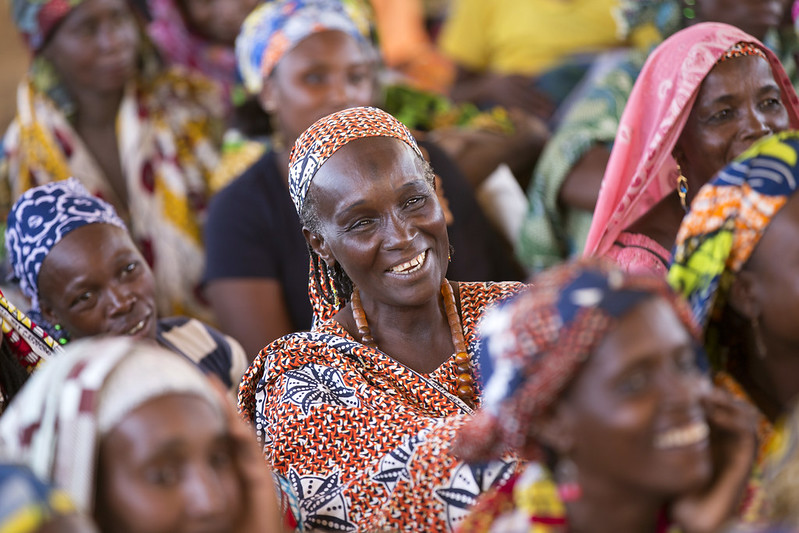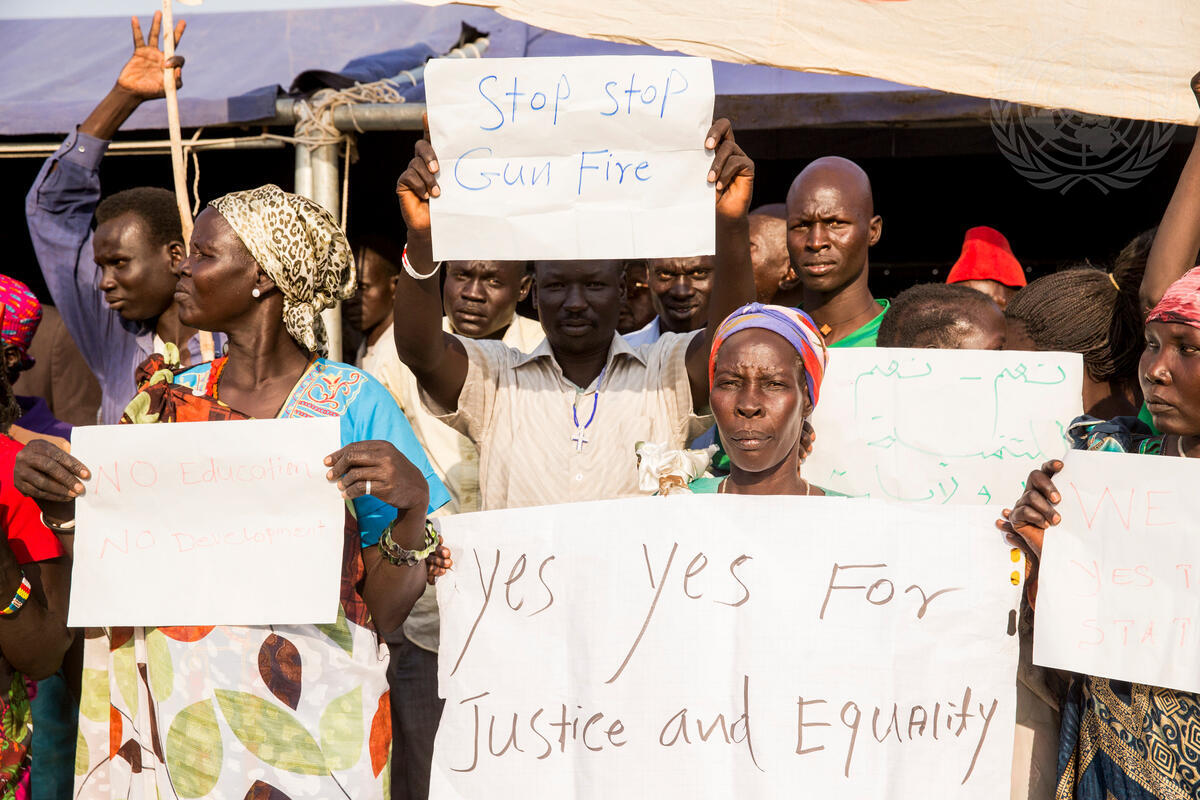National Dialogues and Peace Talks: Key takeaways from our latest peer exchange
The latest instalment in October 2022 of our National Dialogue peer-exchange series looked at the interplay of National Dialogues and peace negotiations. Here are five key takeaways from the discussion led by expert National Dialogue practitioners.
National Dialogues (NDs) often take place during times of turbulence, contestation, and change, including in contexts having recently experienced (or still experiencing) large-scale armed conflict. In such circumstances, the design, conduct, or implementation of NDs can coincide with other political processes, including peace talks. Chad is the latest example where an ND is set to take place in close proximity to peace talks; Ethiopia may soon follow.
Experiences from Cameroon, the Democratic Republic of the Congo (DRC), South Sudan, Yemen, Myanmar, and elsewhere suggest that there are several possible scenarios of how NDs and peace negotiations interact. These scenarios and their practical implications – particularly the trajectories, prospects, and pitfalls of the intersection between NDs and peace negotiations – were used to frame the discussion during the peer exchange.
Five key takeaways
Takeaway 1: the essence of NDs does not always translate into reality
An ND is generally conceived as a formally mandated multi-stakeholder negotiation in which large segments of society and politics are represented, intended to address a broad range of societal, political, and economic issues concerning the entire country.
Beyond this, a range of factors determine the exact nature of an ND; foremost among them are who initiates an ND and with what objective, and who is included. Formal ND mandates can vary considerably, although they often fall into one of three overarching categories: political reform, constitution-making, and peacemaking. But along with the formal mandate, NDs are shaped by their different stakeholders’ differing interests and distinct views of potential gains, and they ways in which they look to use NDs to advance them. This can dilute – and in some cases undermine – the fundamental conception of what an ND is for and how it works. For instance, in the case of heavily co-opted NDs – initiated or controlled by incumbent political elites to preserve or strengthen the political status quo – an ND is unlikely to be intended to be meaningfully inclusive and a catalyst for social and political change. In this way, NDs taking place in proximity to (or serving as) peace talks can serve as a “smokescreen”, a distraction or entirely co-opted process which portrays itself as a sincere attempt at conflict resolution or peacemaking while the primary focus and arena of political (and sometimes violent) contestation lies elsewhere. NDs can also be an instrument of power in other ways: in certain contexts, the participation of civil society actors in an ND paved the way for their subsequent assumption of a formal political role.
As such, while the essence of an ND might be clear in principle, in practice there is no overarching blueprint for an ND, given the many different understandings, mandates, and interests involved.
Takeaway 2: Inclusion is not binary, and is often highly contested
NDs are thus inclusive in essence but not always inclusive in reality. Comparative experience suggests that this is particularly the case in instances where NDs and peace talks take place in proximity to each other, though the question of inclusion can also change over time throughout the lifespan of an ND. Inclusion is also not binary. This is because it is a highly political issue; who is included, how, where and when, are all decisions that can have an impact on the power dynamics that will determine the shape of a country’s economic, social, and political landscape. As such many ND processes give rise to different shades of inclusivity. This is often a mixture of inclusion on the one hand (facilitated by elements such as inclusive selection and decision-making criteria) but also patterns of exclusion (commonly due to elite resistance) – a kind of exclusionary inclusion.
Takeaway 3: The interaction between NDs and peace talks is complex and fluid
The relationship between an ND and peace negotiations – like NDs and peace negotiations themselves – is not fixed, and can evolve over time, or change more suddenly with a shift in the context. Developments in one forum can also affect another forum: National Dialogues and peace talks can positively reinforce each other but also undermine each other, and sometimes both phenomena can occur at different moments within a given peace or political transition process.
There is a wealth of evidence to suggest that once an ND process is hijacked or resisted by key elites, the chances of reaching meaningful and sustainable outcomes are significantly reduced. It then becomes a question of how elite interests manifest themselves or how they can be managed. But elite interests can also change over time.
South Sudan provides an interesting example of this: one of the aims of the ND launched in December 2016 was to complement/help to salvage the 2015 ARCSS by broadening a previously elite process to include public participation. But the genesis and initial realisation of the ND process was heavily co-opted, with low levels of inclusion and little space for meaningful dialogue. Peace talks that were ongoing in parallel to the ND produced an agreement in 2018, after which opposition parties who had been previously reticent, joined the ND. This increased level of political and civil society participation helped to sustain the ND despite the collapse of the parallel peace talks. The ND ultimately produced a series of political reform recommendations, including on limiting federal authority within a federal system, presidential term limits, and ensuring independence among the different branches of government. These specific outcomes led to ruling elites blocking the package of suggested measures. As such, initial co-optation gave way to a more genuine process, whose outcomes were then blocked by elite resistance.

Takeaway 4: It’s potentially the nature of the forum more than the name that matters
There was a suggestion during the exchange that whatever the space for discussion is called – peace talks, a National Dialogue – is less important than the forum ultimately being meaningfully inclusive and addressing the causes of armed conflict. A further suggestion was that creating a dichotomy between peace negotiations and NDs creates both a danger of forum shopping, and also may make NDs more susceptible to elite capture.
Overall, the distinction between NDs and peace negotiations can be important but also sometimes challenging. Both NDs and peace negotiations are spaces where the negotiation and renegotiation of the social and political contract – the crux of peace and political transition processes – can occur. The earlier that unarmed actors beyond the main conflict parties can bring their experiences, aspirations, and influence to bear in these spaces, the greater the likelihood that these spaces and the overall processes will give rise to more inclusive outcomes that can sustainably resolve armed conflict and pave the way for more peaceful, just, and inclusive societies. But different fora can also play complementary roles, and as the example of South Sudan illustrates, be mutually reinforcing and sustaining. This is particularly the case given that gains achieved in one forum will often not prove sustainable unless they are taken up in another forum.
Takeaway 5: NDs and peace processes are specific moments and instruments in broader political transitions
The discussions in the peer exchange echoed a clear message from previous peer exchanges: that NDs are by no means – as they are sometimes portrayed – a definitive solution to all of a country’s problems. In reality, they are often inconclusive and unfinished, and could even be characterised as being inherently open-ended.
This is because NDs and peace talks are just two of the distinct moments and spaces within the ecosystem of fora – both formal and informal – in which peace processes and political transitions are borne out. These processes are not smooth and linear but can rather be characterised as a constant negotiation and renegotiation of the social and political contract, marked by a series of back and forth between progress and setbacks. NDs and peace negotiations are some of the many milestones along this journey.
Our approach to the event series
In hosting this event series, Inclusive Peace and our ND practitioner partners aim to contribute to a better understanding of the dynamics of National Dialogues and explore strategies to improve their effectiveness.
Our approach puts the experience and lessons of ND practitioners at the heart of the discussion, by having peers from different country contexts lead the exchange. Country experts and international experts then have the opportunity to listen and learn from these experiences, but it is the peer exchange that is the main focus of the event.
The previous instalments in the event series, looked at the role National Dialogues can play in helping chart a way towards consensus in tough political environments, the challenges relating to politicisation of National Dialogue processes, and the interaction of National Dialogues and elections. Read more about our work on National Dialogues here.

